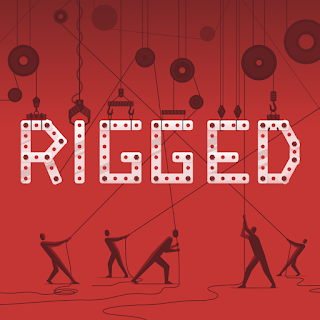What's the difference between misinformation and disinformation? Misinformation is false or out-of-context information that is presented as fact. Disinformation goes one horrible step further. It is intentionally false and designed to deceive.
Both types of destructive information have infected our society, ranging from election fraud lies to wild claims of cures for serious illnesses like COVID.
Just ahead of Congress’s Big Oil disinformation hearings this Thursday,
independent investigative climate journalist Amy Westervelt launches Rigged,
a new web project and companion podcast focused on the history and
functionality of disinformation. It's a rich archive of rare or
never-seen disinformation material that Amy has dug up over years of
research.
"I
started Rigged because I realized I had hundreds of documents on my
desk that weren't doing any good there, and that could be useful to
other reporters working on stories about disinformation, ranging from
climate denial and Covid hoaxers to the Big Lie around the election,”
Westervelt explains. "There's a general sense out there that
disinformation is a relatively new thing, and I think it's important for
people to understand that it's more than a century old, that American
corporations invented many of the techniques we're still seeing today,
and that it was created largely to help American industry circumvent
democracy when it needed to."
The
website offers a rich archive of documents, many rarely or never-before
seen, which Westervelt organizes and puts into context. Through her
original reporting and writing, she demonstrates that disinformation is
not only not a new phenomenon from Russia or Facebook, but it even
predates Big Oil and Big Tobacco’s adoption of science denial.
Westervelt also introduces readers to some key figures in the rise of disinformation, like Standard Oil publicist Ivy Lee, the self-proclaimed "father of public relations" Edward Bernays, corporate exec-whisperer Earl Newsom, tobacco spinmaster Daniel Edelman, and many more.
A companion podcast, also called Rigged,
will tell some of their stories in vivid detail. The first episode,
“Fake Experts and Real Bacon,” explores how Beech-Nut food company
publicist Edward Bernays convinced doctors to tell Americans that a
heavier breakfast was healthier, thus giving birth to the “classic
American breakfast” and sending bacon sales soaring. Rigged is available now on all podcast platforms.
ABOUT AMY WESTERVELT
Amy
Westervelt is the founder of the Critical Frequency podcast network,
and an award-winning print and audio journalist. She contributes to The
Guardian, The Nation, and Rolling Stone, and has previously contributed
to The Washington Post, The New York Times, The Wall Street Journal,
KQED, The California Report, Capital Public Radio, and many other
outlets. In 2007, she won a Folio for her feature on the potential of
algae as a feedstock for biofuel.
In 2015 she was awarded a Rachel
Carson award for "women greening journalism. In 2016 she won an Edward
R. Murrow award for her series on the impacts of the Tesla Gigafactory
in Nevada. In 2019 she won the Online News Association award for
“Excellence in Audio Storytelling,” and in 2021 she won Covering Climate
Now’s audio award.
As the head of Critical Frequency, she has executive
produced more than a dozen podcasts, including projects with Stitcher’s
Witness Docs and Crooked Media. Her book Forget Having It All: How
America Messed Up Motherhood, and How to Fix It was published in
November 2018 by Seal Press.


Comments
Post a Comment
Thank You for your input and feedback. If you requested a response, we will do so as soon as possible.